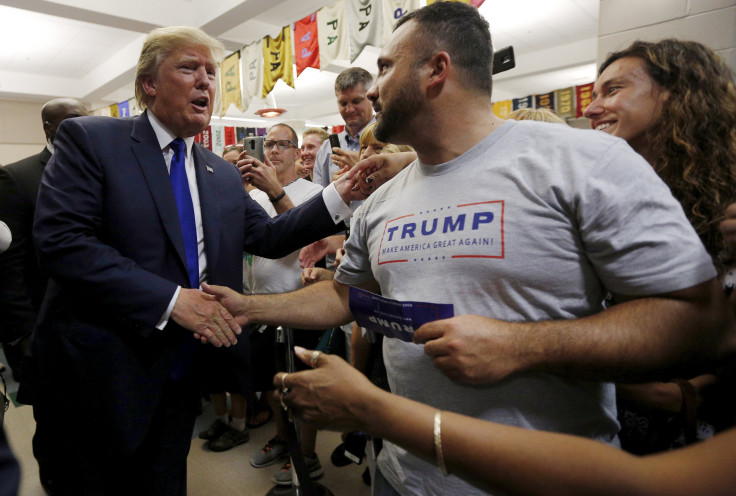Trump's Capital Gains Play: Hypocrisy Or Campaign Genius?

When Mitt Romney's effective tax rate was released in 2012, people were shocked. The Republican nominee for president made $13.7 million in 2011, but he only paid an effective tax rate of 14.1 percent. And just one year earlier, the average American household paid a higher rate than the ultrawealthy Romney at 18.1 percent.
Over the weekend, in was a peculiar step for a Republican, presidential front-runner Donald Trump, who isn't exactly shy about his wealth, issued a press release exclaiming in all capital letters that he was worth $10 billion. He said he wanted to eliminate the capital gains loophole that has been used to help rich people like Romney snag low tax rates. The top percentage tax rate for capital gains is 20 percent, compared to 40 percent for top ordinary income.
"The hedge fund guys didn't build this country. These are guys that shift paper around and they get lucky," Trump said. "It's the wrong thing. These guys are getting away with murder. I want to lower the rates for the middle class."
But what exactly would Trump's capital gains play mean for his own massive piles of cash? Does he benefit from such tax loopholes, and if he does, does that matter for his campaign?
"This is populist gold on the campaign trail. He's trying to pull in as many populist voters in the Republican party as possible. This way, he gets to have a discussion about this as well and make a point that 'Oh, yeah, I can't be bought,' " said Ford O'Connell, a Republican strategist who worked on Republican John McCain's presidential campaign in 2008.
It's hard to say how much Trump pays in taxes each year. He hasn't released tax disclosures, though he has released a rundown of his various assets and income sources. His campaign said he made $362 million in 2014, a figure that does not include dividends, interest, capital gains, rents or royalties. His earnings, it seems, came mostly from sources of income that would be taxed as ordinary income, including his pay for being on NBC's "The Apprentice" show and giving paid speeches.
Still, it's seems unlikely that Trump wouldn't take advantage of the rewards of capital gains. He's taken advantage of other aspects of the financial system and has openly talked about past bankruptcies in some of his companies as a business tool.
"I expect [Trump] to be rolling over a lot of stuff as he can, to avoid it and also to keep as much [income] as possible to be tax exempt or capital gain as opposed to ordinary" income that is taxed at a higher rate, said Stephen Kass, a taxation and bankruptcy attorney in New York City. "These people have the ability to hire the top accounting and tax firms across the country to come up with whatever strategy they might use to minimize their taxes. That’s what anybody who has money usually tries to do."
At the same time, Trump's incredible personal wealth and willingness to use the system is part of the reason why he can rail against the capital gains loophole. In a field of candidates who rely heavily on Wall Street for campaign cash, taking a step that might alienate those donors could pull a significant funding source from campaign coffers and damage a candidate's ability to stay in a competitive race. Trump doesn't have that problem. Whether he's a beneficiary of tax loopholes or not, he's still able to self-fund his campaign, and, therefore, say whatever he wants about the tax code.
"He defies political gravity at every turn," O'Connell said. "At this stage, I don't see the risk for him in it right now. Obviously somebody could try to use it against him, but right now everything ricochets off of him."
Follow me on Twitter: @ClarkMindock
© Copyright IBTimes 2024. All rights reserved.






















